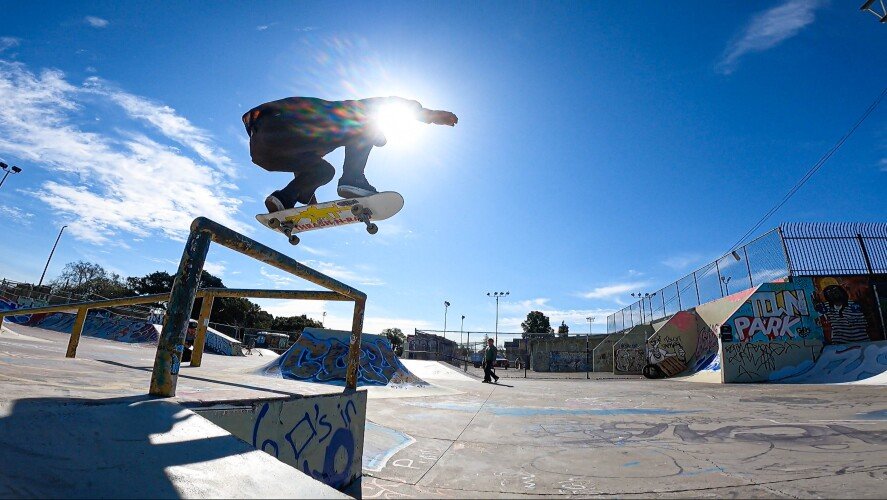
A retreat attendee performs an ollie at Town Park in Oakland, California. Photo by Matt Smythe for Coffee or Die Magazine.
As far as skateparks go, Town Park in Oakland, California, is the largest, gnarliest, and most intimidating I’ve ever seen in person. The sprawling 11,000-square-foot DIY park is full of manny pads, rails, quarter pipes and halfpipes, stairs, curbs, gaps, ramps, spines, walls, hips, kickers, and more, giving skaters endless combinations of lines to grind.
For an old Army vet, a guy whose only frame of reference with a place like this is a brief fascination with skate culture as a kid in the ’80s ad living vicariously through my two teenage skate-punk boys, I am completely out of my depth.
Then I see the 11 other military vets who have gathered here to shred.
For them, this complex is one giant treatment center, each unique feature a concrete-hard therapist to help them get their mind right. This is Day One of the Six Feet Above veteran skate retreat.
It’s a three-day infil at several storied NorCal skate spots, with candid group discussions in the evenings and some hard-earned self-reflection via ollies and nosegrinds.
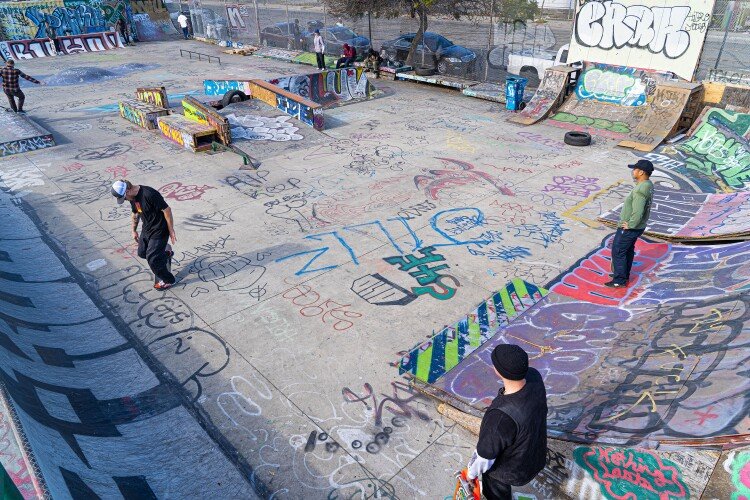
Attendees work on flat-ground tricks and grinding features like manny pads, rails, ramps, and boxes. Photo by Matt Smythe for Coffee or Die Magazine.
Combat to Kickflips
Riley Whitcomb and Benji Manibog are the co-founders of Six Feet Above, a nonprofit that connects and supports veterans and service members through skateboarding to fight the tragic and unacceptable trend of veteran suicides.
Both men are Marine combat veterans — Whitcomb in Light Armored Recon; Manibog as a Marine Raider — who have seen the worst the world has to offer. As a result, they have found themselves face-to-face on countless occasions with the specter of hopelessness that plagues so many of our servicemen and women.
They also share an abiding, lifelong love for skateboarding — an activity that has always grounded and centered them when life gets wrapped around the axle. When pain, anger, doubt, and fear creep into their mind space.
For the two men, a pastime that most view as an act of rebellion and indifference is an all-consuming passion for mastering super-specific skills — embracing every painful, frustrating, and seemingly impossible step to get there. Be it their first ollie or first-try tre flip, landing a trick is inextricably tied to their ability to overcome the mental and physical challenges brought home from their time in service.
Since Sept. 11, 2001, over 30,000 veterans have died by suicide — four times more than the number of US military personnel who died in combat in Iraq and Afghanistan.
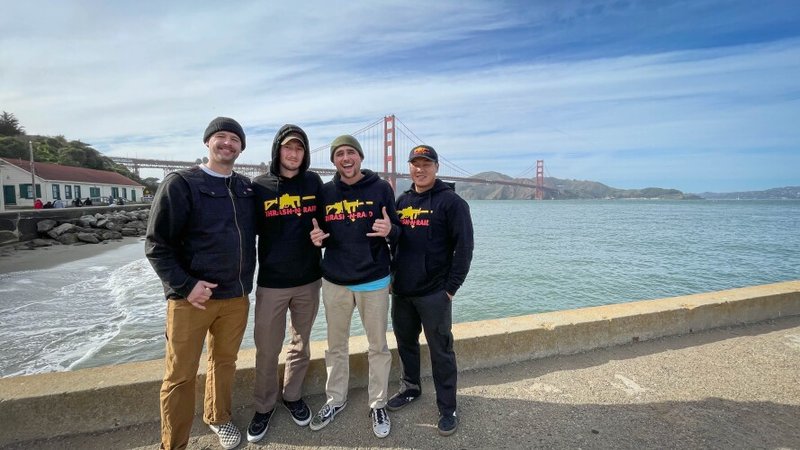
The Six Feet Above squad, from left: Riley Whitcomb, Logan Joyce, Benji Manibog, and Nick Le. Photo by Matt Smythe for Coffee or Die Magazine.
In 2019, the most recent year of data available from the Department of Veterans Affairs, 6,261 veterans in the US took their own lives. Former service members died by suicide at a rate twice as high as nonveterans, and veterans ages 18-34 died at a rate almost three times higher.
The bottom line is that roughly 20 veterans commit suicide every day in the US. That’s a statistic that frustrates Whitcomb.
“I was reading all these ‘rest in peace’ posts on social media,” he says. “There were a lot of people I knew, a lot of people my friends knew. The posts were daily, sometimes almost hourly.”
“One was like, ‘Till we meet again. When I’m 6 feet under, we’ll see you again,’ or whatever. Why do we have that mentality where we gotta wait till someone’s dead in order to care that this is a problem? Why is this not being discussed?”
Squad Goals
Manibog sees Six Feet Above as a way to offer veterans what they are missing now that they’re no longer actively serving.
“There are so many things about the skate community that are similar to the military community,” Manibog says. “One of them is the camaraderie and the brotherhood and sisterhood you have with your fellow skaters. People looking out for one another and lifting each other up.”
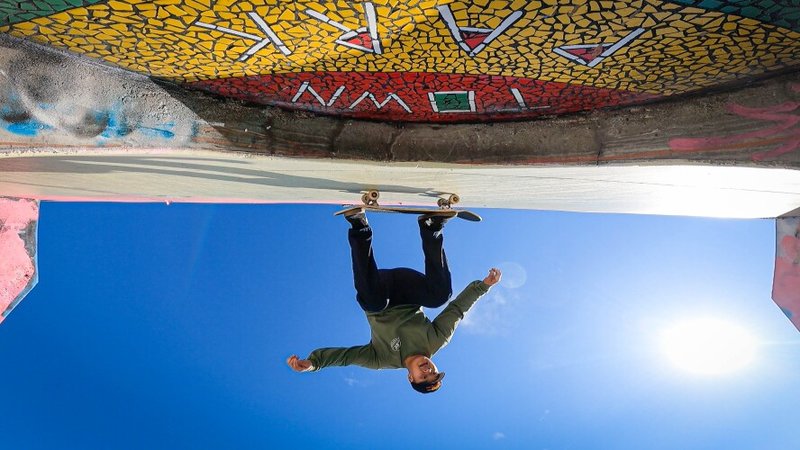
Nick Le rides a high line on a wall at Town Park. Photo by Matt Smythe for Coffee or Die Magazine.
Another is work ethic. Veterans understand discipline, relentless drive, obsessive attention to detail, and fierce loyalty. Training until every movement is deadly efficient and second nature. Adapt and overcome.
When the IED explodes their rig or bullets rip into their patrol, when they can’t save their wrecked buddy while they’re broken and bleeding themselves, or when the chaos of noise and pain become one and the same and they go internal: There is one thing they can count on. The one thing that will keep them from coming unhinged is doing what they’ve been taught.
But what about when they’re no longer in combat? What’s left behind?
In the civilian world, trying to navigate a job interview at Home Depot, shopping for groceries, reconnecting with a wife and new baby, or sitting alone in the dead silence of a barely furnished apartment: The weight of it all is real, so for many, medication turns into self-medication. Productivity slides into self-destruction. Purpose devolves into defeat. They simply can’t translate their high-speed, low-drag training into their new reality.
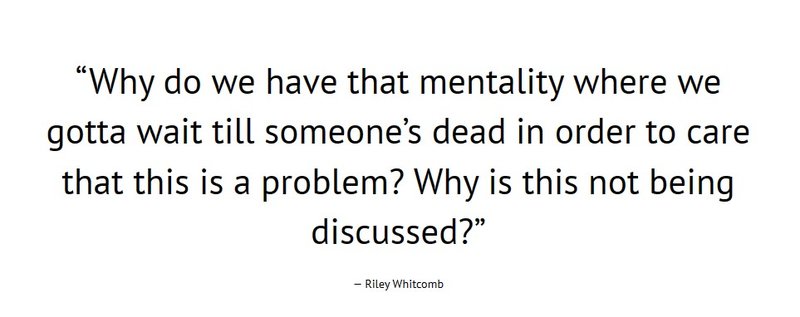
Fly-fishing, deer hunting, and trail running have been my go-to ways to adapt and overcome. Each has its learning curve and deliberate steps to becoming proficient — reaching a place where a graceful and accurate cast, a well-placed arrow, or sure-footed endurance are second nature. Depression, anxiety, addictions, and emptiness fall away, if only for a moment, or at least become more manageable.
Skating holds that same power for Whitcomb and Manibog and hundreds of veterans whom Six Feet Above has reached.
The sweat, scrapes, bruises, sprains, and even breaks that come along with the powerful euphoria of finally nailing a trick are cathartic. They help replace the pervasive, self-destructive thoughts with a hard-earned, positive new perspective. There is a new mission.
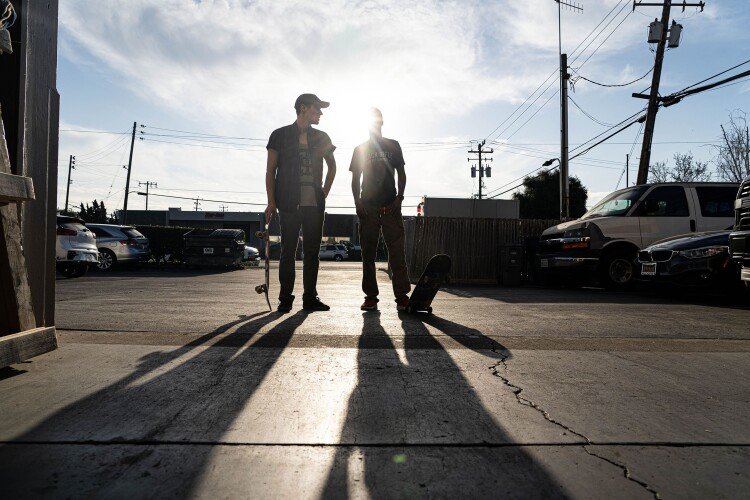
Two attendees take a break during a morning skate session. Photo by Matt Smythe for Coffee or Die Magazine.
Whitcomb says that, if it weren’t for the transcendent healing nature of skating, and his wife’s support, he wouldn’t have been able to turn his life around after he tried taking it.
“Skateboarding gave my son his dad back,” Whitcomb says. “It gave my wife her husband back. Skateboarding saved my life, and I know it can do the same for those who are battling depression, PTS, anxiety, and other mental side effects of their time in service.”
Retreat To Advance
What started as a two-man effort to raise awareness of the suicide trend and offer veterans an alternative “treatment” for the scars of combat has now grown to a core group that hosts veteran skate retreats throughout California.
These retreats are a unique, tangible, and powerful way to help “shred the trend.”
Veterans apply to participate and, if selected, are flown to the retreat location, set up with the group in an Airbnb or other group lodging, and fed a couple of squares a day, and get to skate their faces off for three or four days — not a dime out of their pocket.
The retreats hit up some of Cali’s best-known skate parks or urban skating locations. This particular trip introduces the group to parks like Soma West and 3rd and Army in San Francisco, Fremont Park, Braille House in San Leandro, and Oakland’s Town Park.
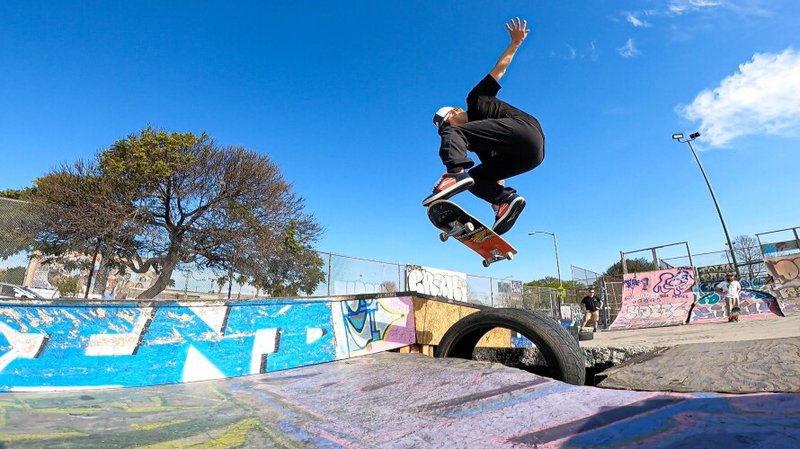
A retreat attendee successfully ollies a pretty gnarly gap at Town Park in Oakland, California, on his fifth attempt. Photo by Matt Smythe for Coffee or Die Magazine.
These are places that most skaters only see in the pages of Thrasher Magazine or YouTube videos, spots where old-school legends like Mike Carroll, Christian Hosoi, and Rodney Mullen have thrown down.
Attendees have met pro skateboarders like Nigel Jones (an Army vet), Jamie Thomas, and Tony Hawk, who spent some time skating and getting to know the group at past retreats.
Of course, while skating is a huge part of the program, it’s ultimately a means to a greater end, which is establishing a strong, supportive connection between participants.
“We’re basically the quick-reaction force that’s going to help get them through,” Manibog says. “So they know that they can count on other veterans, they can count on each other, and not be afraid to speak up.”
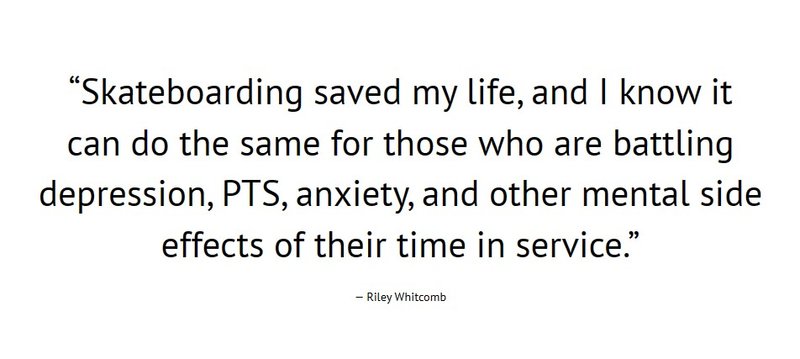
At the end of each day, Whitcomb and Manibog lead a group discussion back at the oceanside Airbnb where we’re staying. They pose a question earlier in the day for the guys to think about while they’re out skating, hoping that they’ll share during the evening muster.
The question for the second evening asks the group to think about who they’d like to say “thank you” to and why — someone they either haven’t ever said it to or haven’t said it enough.
Manibog knows that part of the healing process for veterans is getting them out of their heads.
“Sharing appreciation for someone else who is important to us and why they are important gets us thinking about gratitude instead of negativity,” Manibog says. “We have to remind ourselves to stay grateful for what we have.”
The surf pounds heavily on the rocks below our place in the moonless dark. We sit in a makeshift circle on the couches, chairs, and a couple of bench seats in the living room area. Each veteran shares a name and a brief story about the person they chose.
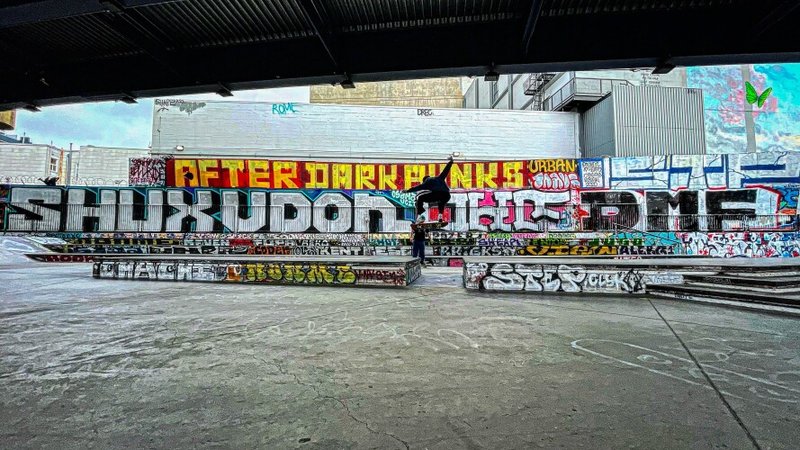
Soma West in San Francisco was all graffiti and big tricks for the group. Photo by Matt Smythe for Coffee or Die Magazine.
Some mention family: wives and kids who have supported them through dark, angry times. Some mention good buddies or leadership they served with and still talk to when things get overwhelming.
A few hold up best friends, their skate homies who died from a drug overdose when they were young, or fellow brothers-in-arms who died more recently in combat. Even in death, they are still helping shape who the men are today and who they’re striving to be in the future.
We raise our drinks and say the name of each person after their story is told. We commit to thanking the person we chose or their family when we get home.
Amid the full days of skating and the thoughtful, candid group discussions, there is a visible, physical shift in the dynamics of the group.
At Town Park on the first day, I watch each veteran as they arrive and roll around on their boards. They quietly take in the features and wild graffiti, sharing semi-guarded nods with one another before finally shaking off whatever weight they carried in and throwing down a kickflip or dropping into the miniramp.
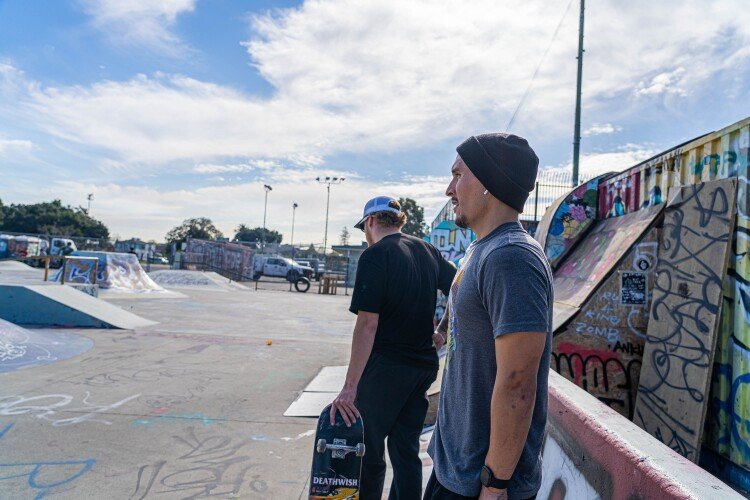
An SFA attendee waits for a run at a feature. Photo by Matt Smythe for Coffee or Die Magazine.
The next day at Fremont, a small group forms to play the skaters’ version of H-O-R-S-E, calling tricks like tre flips, varials, and backside heelflips, while some guys work relentlessly on putting down their own lines.
By the last evening, skating a single halfpipe in a dirt parking lot in Half Moon Bay lit by the rental van’s headlights, all 11 guys are standing on the deck cheering each individual skater who hits a 50-50, nose stall, or rock to fakie.
Even I get a bunch of attaboys while attempting to roll up and down the ramp shakily — louder cheers when the board sails out from under me and I eat shit.
They’re a smiling, sweaty, and happily tired band of shredders — each with restored self-confidence, mental calm, and positive, healthy memories that they’ll carry home to their family and friends.
They’re a unit. They’re tight-knit, and most importantly, they’re 6 feet above.
This article first appeared in the Summer 2022 print edition of The Forward Observer, a special publication from Coffee or Die Magazine as “Shred the Trend.”
Read Next: Raid Team 1: Kickflipping on Fort Bragg With America’s Shadow Warriors
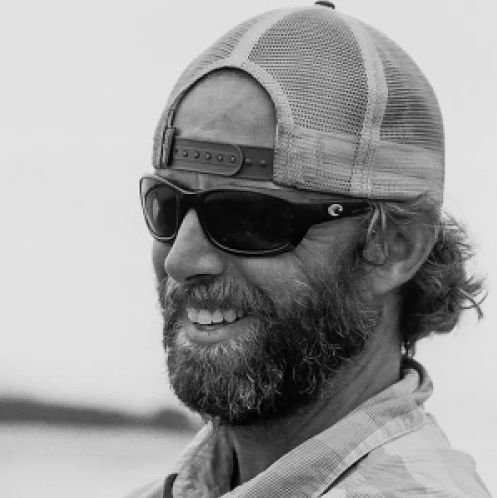
Matt Smythe is a former staff writer for Free Range American. He hails from the Finger Lakes region of western New York. An Army veteran and lifelong outdoorsman, Matt suffers from an inability to sit still. If he’s not in the woods, on the water, or busy with some sort of renovation project, he’s likely elbows-deep in restoring his ’67 Bronco. His work has appeared in Gray’s Sporting Journal, the Fly Fish Journal, The Drake, Southern Culture on the Fly, Revive, Midcurrent, Trout, and a handful of other non-outdoors-related magazines and literary journals.
BRCC and Bad Moon Print Press team up for an exclusive, limited-edition T-shirt design!
BRCC partners with Team Room Design for an exclusive T-shirt release!
Thirty Seconds Out has partnered with BRCC for an exclusive shirt design invoking the God of Winter.
Lucas O'Hara of Grizzly Forge has teamed up with BRCC for a badass, exclusive Shirt Club T-shirt design featuring his most popular knife and tiomahawk.
Coffee or Die sits down with one of the graphic designers behind Black Rifle Coffee's signature look and vibe.
Biden will award the Medal of Honor to a Vietnam War Army helicopter pilot who risked his life to save a reconnaissance team from almost certain death.
Ever wonder how much Jack Mandaville would f*ck sh*t up if he went back in time? The American Revolution didn't even see him coming.
A nearly 200-year-old West Point time capsule that at first appeared to yield little more than dust contains hidden treasure, the US Military Academy said.












